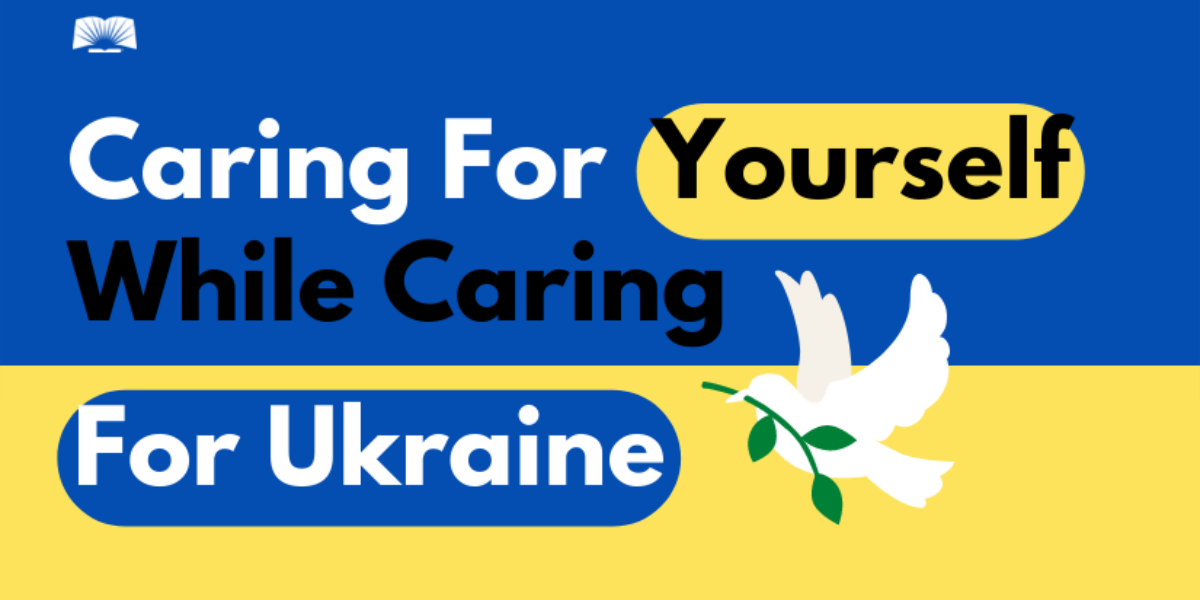Across our screens we have seen nurses and NICU babies hiding in makeshift bomb shelters, burning homes and besieged cities, scared families piling in cars driving west to seek safety. We have witnessed devastation and suffering spread throughout the country of Ukraine. Russia’s invasion of its small neighboring country has received great international exposure. It has been heart-wrenching to see the immense destruction, death, and loss.
Perhaps, like me, you have been feeling quite overwhelmed and helpless watching this war unfold. I have wondered, How can I help? Where is God in all of this pain? How can I continue to engage and support Ukraine without becoming completely overwhelmed?
Over the past few weeks, I’ve been grateful for the opportunity to utilize different trauma healing-informed practices I have learned about through Trauma Healing Institute materials. These resources blend trauma-informed care with biblical teachings.
Here are four themes that have helped me care well for myself as I care for Ukraine. I hope you’ll consider these practices for yourself as you pray for and support Ukrainians in crisis.
Lament
Throughout the Bible there are repeated instances where humans cry out to God in pain. There is Hannah, a barren woman yearning for a child (1 Samuel 1:10-11), the enslaved Israelites fleeing Egypt in search of safety (Exodus 2:23), David huddling in caves while being hunted down (Psalm 57:2-4), and even Jesus himself, tortured, in agony, and feeling abandoned (Matthew 27:46). All of these people were honest with God about their feelings. They wept. They despaired. They complained. They brought their full selves to God. They did not clean up or pretend to be presentable. When we can be vulnerable with God—sharing our sadness, anger, worries, and even doubts—we can more authentically commune with God. This is lamenting. Lamenting helps us identify what we’re feeling, release heavy emotions, and bring our burdens to God. When we feel overcome with difficult emotions as we see the suffering of Ukrainians, we can lament.
Give
I love to see Jesus’s generosity displayed throughout his life on earth. He talked about living and giving extravagantly. “If you host a dinner,” he said, “invite everyone! Go out into the streets, bring in the misfits, the outcast, the poor, the lame, the people who can’t pay you back” (Luke 14:12-14, paraphrase). We are invited to live openly and graciously towards all people, and especially those who cannot repay us. When we give to fellow humans, specifically to the poor, we are giving to God himself. Matthew 25:40 (NIV) says, “Whatever you did for one of the least of these brothers and sisters of mine, you did for me.” Jesus wants us to share our spiritual hope, but also encourages us to share physical aid. If we follow him, providing shelter, food, drink, and clothing to those in need is part of our divine calling. And to God, any amount matters, because he cares more about our hearts being open and generous than giving a specific amount (see Mark 12:41-44). We can give our money and resources to help Ukrainians.
Calm your body
It is easy to be crippled by anxiety and grief when there is such great global suffering. Often this emotional angst takes a toll on our bodies. We can struggle to be present for others and provide support if we are not caring well for ourselves. One way to help when we are feeling overwhelmed is to relax our bodies. This is an important part of well-being. Here is a short guide to relaxing your body:
Wherever you are, take a moment to pay attention
to your body. If it’s safe to do so, close your eyes.
Slowly breathe in, and slowly breathe out. Scan your
body for tension, starting at the bottom of your feet
and moving up all the way to the top of your head.
Just notice where your body is tense. Then, repeat
this scan from your feet to your head, focusing on
relaxing each place in your body where you feel
tension, one at a time.
(Adapted from one of our free Trauma Healing Basics resources, Caregiver Cards)
Activities like calming one’s body, breathing exercises, and doing art help people in crisis feel more grounded. For those of us not directly impacted by this war, relaxing our bodies can also help us take care of ourselves as we respond to those hurting in Ukraine.
Pray to a caring God
Prayer is an honest conversation with God. When we pray, our souls are in a posture of openness and vulnerability. The Bible reminds us that we are safe in God, and that he cares deeply for us. Matthew 8:3 tells the story of Jesus touching a man who everyone avoided due to his leprosy infection; Jesus broke religious and societal boundaries to include someone who was systematically shut out. In 1 Kings 17:8-16 we see Elijah, directed by God, miraculously providing a sustainable source of food for a widow and her child who were destitute. Psalm 10:14 (NIV) says, “But you, God, see the trouble of the afflicted; you consider their grief and take it in hand. The victims commit themselves to you; you are the helper of the fatherless.” In prayer, we are conversing with a divine being who is overflowing with compassion. The God who defied cultural constructs to welcome in the marginalized, acted on behalf of the impoverished, and carried our grief as his own is the same God to whom we pray. We can remember we are communing with a caring, present God when we intercede for Ukrainians.
As we lament, give, take care of our own bodies, and pray to a caring God, we can show up more fully in love and solidarity with our suffering friends in Ukraine.





